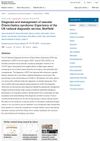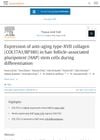 39 citations,
May 2014 in “Frontiers in Pharmacology”
39 citations,
May 2014 in “Frontiers in Pharmacology” Special immune cells called Tregs can help prevent lung scarring by blocking a specific growth factor.
 April 2024 in “Journal of cancer research and clinical oncology”
April 2024 in “Journal of cancer research and clinical oncology” Tissue-derived extracellular vesicles are crucial for cancer diagnosis, prognosis, and treatment.
 1 citations,
August 2023 in “Frontiers in immunology”
1 citations,
August 2023 in “Frontiers in immunology” Traditional Chinese medicinal foods may help manage long-term post-COVID symptoms.
 68 citations,
September 2018 in “International Journal of Molecular Sciences”
68 citations,
September 2018 in “International Journal of Molecular Sciences” Air pollution (PM10) increases skin inflammation and aging by reducing collagen and may trigger a repair response in skin cells.
 September 2013 in “Science”
September 2013 in “Science” Certain astrocytes can protect the brain and improve recovery after a stroke, and a hair loss drug might reduce cancer spread.
 353 citations,
February 2022 in “Nature Immunology”
353 citations,
February 2022 in “Nature Immunology” Long-haul COVID can cause lasting symptoms affecting many body systems and may be linked to ongoing inflammation and immune system issues.
 9 citations,
May 2021 in “Immunological Reviews”
9 citations,
May 2021 in “Immunological Reviews” Different types of fibroblasts play various roles in kidney repair and aging, and may affect chronic kidney disease outcomes.
 8 citations,
June 2022 in “Frontiers in bioengineering and biotechnology”
8 citations,
June 2022 in “Frontiers in bioengineering and biotechnology” A patch made from human lung fibroblast material helps heal skin wounds effectively, including diabetic ulcers.
 2 citations,
October 2020 in “Journal of Pharmacology and Experimental Therapeutics”
2 citations,
October 2020 in “Journal of Pharmacology and Experimental Therapeutics” Minoxidil does not work to inhibit lysyl hydroxylases in newborn mouse lungs.
 November 2023 in “Advanced Science”
November 2023 in “Advanced Science” A specific hair protein variant increases the spread of breast cancer and is linked to worse survival rates.
 18 citations,
April 2013 in “PLOS ONE”
18 citations,
April 2013 in “PLOS ONE” Mice with autoimmune hair loss showed signs of heart problems.
 14 citations,
May 2021 in “Marine Drugs”
14 citations,
May 2021 in “Marine Drugs” PDRN, derived from salmon sperm, shows promise in healing wounds, reducing inflammation, and regenerating tissues, but more research is needed to understand its mechanisms and improve its use.
 1 citations,
March 2023 in “European Journal of Human Genetics”
1 citations,
March 2023 in “European Journal of Human Genetics” The UK's EDS National Diagnostic Service found that early diagnosis, lifestyle advice, and regular check-ups are crucial for managing vascular Ehlers-Danlos syndrome. A combination of losartan and bisoprolol can reduce vascular events, improving survival and quality of life.
 155 citations,
August 1991 in “Journal of The American Academy of Dermatology”
155 citations,
August 1991 in “Journal of The American Academy of Dermatology” Methotrexate treats various disorders by inhibiting DNA synthesis, but careful monitoring is needed to avoid toxicity and manage side effects.
 November 1966 in “British Journal of Dermatology”
November 1966 in “British Journal of Dermatology” The meeting discussed various skin conditions, treatments, and unusual cases, highlighting the effectiveness of tetracycline in treating rosacea.
March 2024 in “Biomedicines” Mesenchymal stem cells show promise for effective skin repair and regeneration.
 5 citations,
January 2017 in “Elsevier eBooks”
5 citations,
January 2017 in “Elsevier eBooks” The document concludes that cosmetics need biocompatible, eco-friendly ingredients due to aging populations and demand for effective products.
 June 2024 in “Synthetic and systems biotechnology”
June 2024 in “Synthetic and systems biotechnology” A fragment of human type XVII collagen shows great potential for skin health and wound healing.
2 citations,
September 2023 in “International journal of molecular sciences” Special proteins are important for skin balance, healing, and aging, and affect skin stem cells.
 11 citations,
June 2019 in “Tissue & Cell”
11 citations,
June 2019 in “Tissue & Cell” Hair stem cells produce a protein called COL17A1 that plays a key role in their development and is linked to hair thinning and baldness.
488 citations,
July 2021 in “Cell” Fibroblasts are crucial for tissue repair and inflammation, and understanding them can help treat fibrotic diseases.
 77 citations,
July 2013 in “Best Practice & Research in Clinical Obstetrics & Gynaecology”
77 citations,
July 2013 in “Best Practice & Research in Clinical Obstetrics & Gynaecology” Menopause reduces skin collagen and elasticity, and while estrogen therapy can help, its risks require careful consideration.
 9 citations,
July 2020 in “Biomedicine & Pharmacotherapy”
9 citations,
July 2020 in “Biomedicine & Pharmacotherapy” Mitochondrial therapy and platelet-rich plasma therapy both stimulated hair regrowth in aging mice, with mitochondrial therapy showing similar effectiveness to plasma therapy.
 139 citations,
December 2020 in “Cell Stem Cell”
139 citations,
December 2020 in “Cell Stem Cell” Male hormones affect COVID-19 severity and certain drugs targeting these hormones could help reduce the risk.
 4 citations,
November 2022 in “Frontiers in Immunology”
4 citations,
November 2022 in “Frontiers in Immunology” Lung and liver macrophages protect our tissues and their dysfunction can cause various diseases.
6 citations,
October 2020 in “Frontiers in cell and developmental biology” WWOX deficiency in mice causes skin and fat tissue problems due to disrupted cell survival signals.
 49 citations,
January 2018 in “Theranostics”
49 citations,
January 2018 in “Theranostics” The new skin patch with human matrix and antibiotic improves wound healing.
 37 citations,
January 2019 in “Food science & nutrition”
37 citations,
January 2019 in “Food science & nutrition” Bergamot may improve heart health, skin conditions, and mood, but more research is needed to confirm these benefits.
182 citations,
May 2003 in “Development” Myc activation reduces skin stem cells by affecting cell adhesion.
 69 citations,
September 1991 in “Journal of Surgical Research”
69 citations,
September 1991 in “Journal of Surgical Research” Understanding how fetal wounds heal could help improve healing in adults.
























